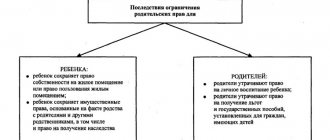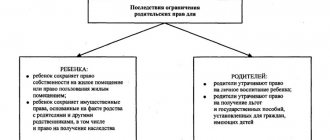The issue of paying alimony today is one of the most pressing after the divorce of spouses. This is primarily due to the fact that after the breakup of the family, the child remains to live with one of the parents, and according to the Family Code (Article 80), the second parent must take part not only in raising the joint child, but also in its maintenance. But, as practice shows, only a quarter of the fathers of our country regularly fulfill their duties. Many mothers simply turn a blind eye to this and support the child on their own, and some resort to forced collection through the courts. And they do the right thing, since they first of all defend the interests of the child. But what happens if the dependent has already reached the age of majority, but does not work due to education or disability. Should a father continue to pay child support after age 18, and what laws govern this issue?
Law on child support after the child reaches the age of majority
Paying child support is not just the desire of one of the parents to help their child, but also his direct responsibility. This rule is regulated by Articles 80 and 100 of the Family Code. However, the same articles clearly state that child support is paid until the child reaches the age of majority, except in cases where the dependent is declared incompetent. In all other cases, for ordinary students who do not have health problems, the second parent does not pay child support. That is why the court very often rejects such applications. But as you understand, there are exceptions. We will talk about this further.
Legislative basis
What does the child support law say? The main regulatory act within which the decision is made on the payment of alimony to the father from a child after 18 years of age and vice versa is the Family Code.
Article 80 establishes the obligation of parents to support children, but payment of maintenance is limited by age.
In Part 1, Clause 2, Art. 120 states that the deduction of payments prescribed by a court decision after reaching the age of majority ceases. But this procedure does not apply to the agreement concluded by the parents. The obligations towards children specified in this document will cease, in accordance with paragraph 1 of Art. 120 when the deadline established by the parties arrives.
Extension of payments after adulthood is possible if there are grounds for this given in Art. 85:
- disability of the recipient;
- need for help.
Given these grounds, two options are possible:
- reach an agreement voluntarily and extend the deductions;
- seek to have the court establish a fixed amount of monthly contributions.
In what cases is alimony required after 18 years of age?
As we have already said, the legal action for child support payments ceases when he reaches the age of majority. The question of their continuation should be raised separately, since this is a completely different type of collection. Based on the legislative framework of the Russian Federation, financial assistance for a child from the second parent for his maintenance after reaching 18 years of age is provided in the following cases (Chapter 13 of the RF IC):
- if a child is declared incapable of work, a disabled person of group 1, 2 or 3 (if a person can work with the third group, then alimony payments are withdrawn from him), and therefore cannot support himself independently for good reasons;
- if a child has an urgent need and needs financial assistance, which is of vital importance. This interpretation is not more fully explained in the law, so whether to award alimony or not, depending on the specific situation, remains at the discretion of the judge or the parents themselves, if the father helps the child voluntarily.
That is, the situation is ambiguous. If the child’s age is 18 years and he is studying, regardless of whether he is in a higher educational institution or not, then he will be able to receive alimony from the second parent only on the condition that he cannot support himself independently, and not because he is studying, but because he is recognized officially disabled. As for a healthy student child, the issue will only be resolved through the court on an individual basis and if there are good reasons, since the law does not say anything about this.
Payment of child support after 18 years of age if the child is studying
Very often, a mother who lives with an adult child (over 18 years old) cannot fully cover all of his expenses, especially if he is a student and studies on a paid basis, and therefore demands that his father help financially, although in fact his responsibilities to the child have already ended. This is the most important misconception and is not the basis for awarding alimony. From a moral point of view, yes, but from a legal point of view, no. After all, the costs associated with training are in no way vital. Such a requirement can only be made by a mother whose child is studying and has been declared disabled.
This issue is raised quite often and for good reason, since since 2015 the State Duma has submitted for consideration a bill on amendments to the Family Code, where they wanted to oblige the second parent to continue paying child support after he has reached 18 years of age, provided that he is full-time students (Draft Law 876581-6). However, this bill never received legal force and to date no changes have occurred. Perhaps in 2021 the situation will take on a new meaning from the legislative framework. In the meantime, an able-bodied student can count on alimony only if his father helps him financially at his own request.
Until what age is child support paid if the child is studying?
The period of study of an adult child is considered to be from 18 to 24 years old if he is enrolled in a university. In other educational institutions, this period will be shorter, and accordingly, payments will stop much earlier. It is also important that the word “study” means only full-time education. But again, we return to the previous point, this statement does not apply to able-bodied adult children, and the edition of the Family Code has not yet been supplemented with a new addition to Article 85. And if this is a disabled child, then he will need to be supported not only until he is 24 years old, but and until the end of life.
Payments may be terminated even for an incapacitated disabled child if he gets a job or works part-time, that is, he can independently cover his monthly expenses.
Agreement on payment of child support to a student
In accordance with Art. 99 of the Family Code of the Russian Federation, alimony payments for an adult student can be determined by agreement. The fact is that this article provides for a voluntary procedure for paying alimony in various cases - when money is needed to raise a minor child or an adult (both in education and without education).
Despite the fact that this norm indicates that the agreement is concluded by the person obligated to pay alimony (and in the case of supporting a student, the parent does not have such an obligation), in practice, written agreements on the material participation of parents for the period of education of adult children are drawn up.
Collection of child support for an adult child of a student
Alimony is financial assistance that is legally due to a child or other family member, subject to certain circumstances. As for a child who has turned 18 years old, the issue has many nuances and is most often resolved through the courts.
Voluntary and judicial recovery
To resolve this issue, however, as in other controversial situations, there are two solutions - voluntary and forced. The easiest way to resolve the issue is by mutual consent of the parents. This will not only save money and time, but also nerves. The issue of supporting a student is most often resolved peacefully when the father is not indifferent to the life of his child. Usually, as life practice shows, the agreement is observed verbally, but this is most often the main mistake, as a result of which it is then impossible to prove the fact of violation of the agreement. Therefore, it is best if you come to a common decision and record it all on paper, which will subsequently be certified by a notary, thereby making it legally binding. This agreement must indicate the amount of assistance, form of payment, procedure, and responsibility of the parties.
The court deals with child support if the parents were unable to reach a peaceful settlement of the issue. Most often this happens due to the father's refusal. Judicial collection will occur forcibly (Article 85 of the RF IC). The court will primarily take into account the financial situation of both parties, the argumentation and evidentiary basis of the claim, and the situation of the child. You must understand that getting a positive decision on child support after 18 years of age, if the child is absolutely healthy, will be quite difficult, since this rule is not fixed by the Family Code.
In addition to the mother, the adult child himself, as well as his guardian, can file a claim in court.
Statute of limitations
This question is no less relevant, as is the procedure for filing a claim for the award of alimony payments to a student. If there are legal grounds, special need and disability, confirmed by documentation, does not relieve the parents of responsibility for maintaining the child. Therefore, there is no statute of limitations on this issue.
Claim for alimony after 18 years
A claim for alimony after 18 years of age must be filled out in accordance with regulatory requirements, just like other official applications to the judicial authorities. You can see a similar example on our website.
Sample application for collection of alimony after 18 years of age
Required documents
In addition to the correctly completed claim, you must provide the following documents:
- plaintiff's passport;
- child's passport;
- child’s birth certificate (if the single mother and father are not registered in the child’s birth document, then a court decision establishing paternity must be presented);
- mother's income certificate;
- a certificate from the Housing Office stating that the mother lives with the child;
- certificate of the child’s health status (hospital, MSEC);
- a previously issued court decision on the collection of alimony;
- list of monthly expenses;
- if possible, a certificate of father's income.
As for the receipt for payment of the state duty, the plaintiff in such a situation is exempt from this obligation, since the application raises the issue of the interests of the child. If the decision is positive, then the defendant pays the state fee.
How does the trial work?
After you have drawn up a statement of claim and collected a package of necessary documents, the case goes to the bailiff for consideration. This issue is resolved through the magistrate's court. The case is usually considered for up to 10 days, after which a meeting is scheduled with the presence of both parties. To do this, they must be notified in advance. At the meeting, if there are disputes, each party must express their claims and justify them, after which the judge makes his decision, referring to the standards of the legislative framework, as well as individual family circumstances. If, according to the court decision, the plaintiff’s request was granted, then a writ of execution is issued (to both the mother and the father), on the basis of which alimony will be collected for the child who has already reached the age of majority.
In order for the judge to take the side of the mother with the child who is at the stage of education after reaching the age of majority, it is necessary to present at the meeting the maximum number of arguments regarding the need for financial assistance from the father, and it is desirable that these are not just unfounded demands, but documents and certificates confirming this . If the court nevertheless decides in favor of the plaintiff, then after graduation or expulsion from the university, money stops being paid, unless alimony is assigned for life (when the child is disabled in group 1 or 2). And if training is resumed in the future, then it is necessary to re-file a second claim in court to restore alimony payments.
When alimony is paid to an adult child during his education, the court will take into account even the period when the dependent could work, for example, official holidays and weekends.
Lawyer's answers to private questions
Is it possible to recover child support for the past period if the child is 18 and has not previously been awarded?
Yes, within the three-year period preceding the date of filing the application (Article 107 of the RF IC). For example, if your son or daughter turns 18, you can claim payments for 15, 16 and 17 years. But the plaintiff will have to prove that he previously made attempts to obtain payments. As evidence, you can use certified screenshots of correspondence with the defendant and recordings of conversations.
Is it necessary to extend child support after 18 years of age?
Yes. After reaching adulthood, alimony obligations cease, and in order to assign them again, you need to file a statement of claim. The court will determine whether there are grounds and make a decision.
Is there alimony after 18 years of age if the payer already has a difficult financial situation in the family?
Depends on the circumstances of the particular case and the needs of each party. If the father’s income is small, but allows him to pay at least the minimum alimony, and the child needs it, the court will satisfy the requirements.
Is child support paid after 18 years to the child or to the mother with whom he lives?
If the child is incapacitated, the money will go to the guardian, but he has no right to spend it on himself. If a daughter or son simply needs help and is disabled, they can receive payments on their cards.
Is it possible to collect child support from the father after the child turns 18?
Yes, if the child himself is able to work, but the father is not, and needs financial assistance (Article 87 of the RF IC). A parent who has previously been deprived of parental rights cannot demand payment for himself. The court may also release the child from child support obligations if it is proven that while he was a minor, the plaintiff did not provide him with financial support and did not take part in his life.
Amount of child support after 18 years of age
Alimony does not tend to assign one single amount to all dependents. Their size is determined individually - either by a court decision or by mutual consent of both spouses.
Through the court
Alimony after 18 years is established only in a fixed form. When calculating their size, the judge takes as a basis the level of subsistence level in the country or in a particular region (where the child lives), as well as the needs of the dependent, the marital status of each parent, and other circumstances. The judge tries to arrive at a final payment amount that will not harm the interests of both parties.
By mutual consent, without trial
If the father himself takes the initiative to help his child, then they can establish the amount of alimony together with the mother without involving the judiciary. Sometimes this agreement is reached by verbal agreement, but it is best if you fix all the nuances on paper with further registration with a notary. This will help avoid future violations by the payer. The amount of alimony in this case is assigned at the discretion of both parents, but so that the amount is not less than the subsistence level and also covers the needs of the child. Therefore, the notarial agreement must indicate not only the monthly amount of alimony payments, but also the method of their transfer, duration, and responsibility for violation of agreements.
How to prove a child’s need for additional maintenance and what documents are needed
How to extend child support payments if the child is studying?
We recommend! Alimony and alimony obligations
In order for the court to order the father to pay for education after the age of 18, the need for such support must be convincingly proven.
The need for financial assistance can be confirmed by information from several sources.
Documents for child support
Here is the main list of materials that most often have to go to court:
- A certificate from the university confirming completion of training, indicating the presence or absence of a scholarship.
- Certificate of the amount of tuition fees for education.
- Copy of the passport.
- Information about the financial situation of the parent with whom the student lives: a certificate from work or an employment center, a document from the social security authority.
- Written confirmation that the applicant is not working.
- A copy of the work book. It could have been opened when the child worked for some time before entering college.
If a child suffers from a chronic illness, a doctor's opinion may be required that he or she requires medication or ongoing medical care.
To begin the collection procedure in court, other information may be required. You can clarify their composition during consultation with a lawyer.
He will also give advice on his part about how in practice alimony is paid for a child out of wedlock over 18 years of age who is continuing his education.
Judicial practice on alimony after 18 years
To more fully address the issue of alimony after 18 years of age, let us turn to judicial practice. Here is one example. Citizen Petrova, who is raising a child alone, filed a lawsuit to extend alimony payments, arguing that the adult is at the stage of studying at a higher educational institution and until he receives a diploma, the father is obliged to continue to help the mother support him. No additional conditions were stated, such as the health status of the child or mother. Referring to Articles No. 85, 86, 120, the court refused the woman’s request, citing the fact that the child is fully able to work and can provide for himself, and studying at a university is not a vital need.
This rule is acceptable only for disabled children, who, in principle, can count on their support for the rest of their lives, regardless of whether they receive an education or not, if after they reach the age of 18 they cannot earn money on their own for a good reason, namely for health reasons. But even here there are exceptions, despite the child’s disability, if after turning 18 he can find a suitable job, for example, tutoring or selling things made with his own hands, then the court reserves the right for the father not to pay child support.
That is, you must clearly distinguish: if a child is studying and declared incompetent, then he has the right to apply for payment of financial assistance from the second parent, and if the child is healthy and can provide for himself, then by law, by the age of 18, he ceases to receive alimony, regardless of where and in what form of training he is. To date, the previously issued amendments have not accepted legal force and therefore have no right to exist. The father can pay alimony only at his own discretion on a voluntary basis or by court decision, if circumstances so require. But this happens extremely rarely in practice.










